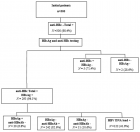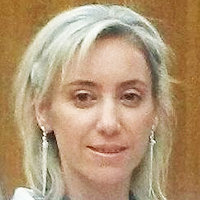Abstract
Research Article
Elderly (> 70 years) Multiple Myeloma Patients Benefit Equally from Autologous Hematopoietic Stem Cell Transplantation When Compared to Younger Patients
Nicholas Prabhakar, Sheila Haugh, Leonard Klein, Tulio Rodriguez and Jacob Bitran*
Published: 08 August, 2024 | Volume 8 - Issue 1 | Pages: 042.047
Autologous Hematopoietic Stem Cell Transplantation (AHSCT) performed after induction therapy is the standard of care for newly diagnosed Multiple Myeloma (MM) patients who qualify. Our institution has performed AHSCT for MM since 1991, and in this study, we sought to retrospectively examine the outcomes of 303 MM patients who underwent AHSCT from 1991-2021. We focused on Overall Survival (OS) and Progression-Free Survival (PFS) in patients in addition to Landmark survival (1-year post-transplantation). We found that in elderly patients > 70 years of age there was no significant difference in OS at 12 years, with 51% for patients < 70 years of age and 50% > 70; these were the same numbers for PFS at 12 years as well. We also found that median overall survival is improving overall with each decade in our transplanted MM patients with patient survival improved to over > 80% regardless of age at 7 years, when the previous median overall survival was 6 - 6.6 years before 2001. Given our findings, supported by others, we show that survival is continually improving over time in MM AHSCT patients and that AHSCT can be performed safely with equivalent landmark and long-term PFS and OS in patients of advanced age.
Read Full Article HTML DOI: 10.29328/journal.jsctt.1001042 Cite this Article Read Full Article PDF
Keywords:
Multiple myeloma; Autologous stem cell transplantation; Long-term transplant survival; Advanced age patients
References
- Kyle RA, Rajkumar SV. Multiple myeloma. Blood. 2008 Mar 15;111(6):2962-2972. Available from: https://doi.org/10.1182/blood-2007-10-078022
- Alwall N. Urethane and stilbamidine in multiple myeloma: Report on two cases. Lancet. 1947;2(6472):388. Available from: https://doi.org/10.1016/s0140-6736(47)90375-9
- Blokhin N, Larionov L, Perevodchikova N, Chebotareva L, Merkulova N. Annals of the New York Academy of Sciences. 1958;68(3):1128-1132. Available from: https://doi.org/10.1111/j.1749-6632.1958.tb42675.x
- Mass RE. A comparison of the effect of prednisone and a placebo in the treatment of multiple myeloma. Cancer Chemother Rep. 1962;16:257-259. Available from: https://pubmed.ncbi.nlm.nih.gov/14470881/
- Osgood EE. The survival time of patients with plasmocytic myeloma. Cancer Chemother Rep. 1960;9:1-10. Available from: https://pubmed.ncbi.nlm.nih.gov/13731417/
- Singhal S, Mehta J, Desikan R, Ayers D, Roberson P, Eddlemon P, et al. Antitumor activity of thalidomide in refractory multiple myeloma. N Engl J Med. 1999 Nov 18;341(21):1565-1571. Available from: https://doi.org/10.1056/nejm199911183412102
- Richardson PG, Barlogie B, Berenson J, Singhal S, Jagannath S, Irwin D, et al. A phase 2 study of bortezomib in relapsed, refractory myeloma. N Engl J Med. 2003 Jun 26;348(26):2609-2617. Available from: https://doi.org/10.1056/nejmoa030288
- Osserman EF, DiRe LB, DiRe J, Sherman WH, Hersman JA, Storb R. Identical twin marrow transplantation in multiple myeloma. Acta Haematol. 1982;68(3):215-223. Available from: https://doi.org/10.1159/000206984
- Barlogie B, Alexanian R, Dicke KA, Zagars G, Spitzer G, Jagannath S, Horwitz L. High dose chemoradiotherapy and autologous bone marrow transplantation for resistant multiple myeloma. Blood. 1987 Sep;70(3):869-872. Available from: https://pubmed.ncbi.nlm.nih.gov/3304465/
- Attal M, Harousseau JL, Stoppa AM, Sotto JJ, Fuzibet JG, Rossi JF, et al. A prospective, randomized trial of autologous bone marrow transplantation and chemotherapy in multiple myeloma. Intergroupe Francais du Myelome. N Engl J Med. 1996;335(2):91-97. Available from: https://doi.org/10.1056/nejm199607113350204
- Child JA, Morgan GJ, Davies FE, Owen RG, Bell SE, Hawkins K, et al. High-dose chemotherapy with hematopoietic stem-cell rescue for multiple myeloma. N Engl J Med. 2003 Mar 27;348(13):1875-1883. Available from: https://doi.org/10.1056/nejmoa022340
- Lehners N, Becker N, Benner A, Pritsch M, Löpprich M, Mai EK, et al. Analysis of long-term survival in multiple myeloma after first-line autologous stem cell transplantation: impact of clinical risk factors and sustained response. Cancer Med. 2018;7(2):307-316. Available from: https://doi.org/10.1002/cam4.1283
- Kumar SK, Rajkumar SV, Dispenzieri A, Lacy MQ, Hayman SR, Buadi FK, et al. Improved survival in multiple myeloma and the impact of novel therapies. Blood. 2008 Mar 1;111(5):2516-2520. Available from: https://doi.org/10.1182/blood-2007-10-116129
- Nishimura KK, Barlogie B, van Rhee F, Zangari M, Walker BA, Rosenthal A, et al. Long-term outcomes after autologous stem cell transplantation for multiple myeloma. Blood Adv. 2020;4(2):422-431. Available from: https://doi.org/10.1182/bloodadvances.2019000524
- Schaapveld M, Visser O, Siesling S, Schaar CG, Zweegman S, Vellenga E. Improved survival among younger but not among older patients with multiple myeloma in the Netherlands, a population-based study since 1989. Eur J Cancer. 2010;46(1):160-169. Available from: https://doi.org/10.1016/j.ejca.2009.07.006
- Oliver-Caldes A, Soler-Perromat JC, Lozano E, Moreno D, Bataller A, Mozas P, et al. Long-term responders after autologous stem cell transplantation in multiple myeloma. Front Oncol. 2022;12:936993. Available from: https://doi.org/10.3389/fonc.2022.936993
- Pasvolsky O, Wang Z, Milton DR, Tanner MR, Bashir Q, Srour S, et al. Multiple myeloma patients with a long remission after autologous hematopoietic stem cell transplantation. Blood Cancer J. 2024;14(1):82. Available from: https://doi.org/10.1038/s41408-024-01062-2
- Paquin A, Visram A, Kumar SK, Gertz MA, Cantwell H, Buadi FK, et al. Characteristics of exceptional responders to autologous stem cell transplantation in multiple myeloma. Blood Cancer J. 2020;10:87. Available from: https://doi.org/10.1038/s41408-020-00353-8
- Munshi PN, Vesole D, Jurczyszyn A, Zaucha JM, St Martin A, Davila O, et al. Age no bar: A CIBMTR analysis of elderly patients undergoing autologous hematopoietic cell transplantation for multiple myeloma. Cancer. 2020 Dec 1;126(23):5077-5087. Available from: https://doi.org/10.1002/cncr.33171
- Sharma M, Zhang MJ, Zhong X, Abidi MH, Akpek G, Bacher U, et al. Older patients with myeloma derive similar benefit from autologous transplantation. Biol Blood Marrow Transplant. 2014;20(11):1796-1803. Available from: https://doi.org/10.1016/j.bbmt.2014.07.013
- El Cheikh J, Kfoury E, Calmels B, Lemarie C, Stoppa AM, Bouabdallah R, et al. Age at transplantation and outcome after autologous stem cell transplantation in elderly patients with multiple myeloma. Hematol Oncol Stem Cell Ther. 2011;4(1):30-36. Available from: https://doi.org/10.5144/1658-3876.2011.30
- Kumar SK, Dingli D, Lacy MQ, Dispenzieri A, Hayman SR, Buadi FK, et al. Autologous stem cell transplantation in patients of 70 years and older with multiple myeloma: Results from a matched pair analysis. Am J Hematol. 2008 Aug;83(8):614-617. Available from: https://doi.org/10.1002/ajh.21191
- Bashir Q, Shah N, Parmar S, Wei W, Rondon G, Weber DM, et al. Feasibility of autologous hematopoietic stem cell transplant in patients aged ≥70 years with multiple myeloma. Leuk Lymphoma. 2012;53(1):118-22. Available from: https://doi.org/10.3109/10428194.2011.606942
- Qazilbash MH, Saliba RM, Hosing C, Mendoza F, Qureshi SR, Weber DM, et al. Autologous stem cell transplantation is safe and feasible in elderly patients with multiple myeloma. Bone Marrow Transplant. 2007;39(5):279-283. Available from: https://doi.org/10.1038/sj.bmt.1705580
- Ludmir EB, Mainwaring W, Lin TA, Miller AB, Jethanandani A, Espinoza AF, et al. Factors associated with age disparities among cancer clinical trial participants. JAMA Oncol. 2019;5(12):1769-1773. Available from: https://doi.org/10.1001/jamaoncol.2019.2055
- Stadtmauer EA, Pasquini MC, Blackwell B, Hari P, Bashey A, Devine S, et al. Autologous transplantation, consolidation, and maintenance therapy in multiple myeloma: Results of the BMT CTN 0702 trial. J Clin Oncol. 2019;37(7):589-597. Available from: https://doi.org/10.1200/jco.18.00685
- Gehan EA. A generalized Wilcoxon test for comparing arbitrarily single-censored samples. Biometrika. 1965;52(3-4):203-224. Available from: https://doi.org/10.2307/2333825
- Anderson KC, Alsina M, Bensinger W, Biermann JS, Cohen AD, Devine S, et al. Multiple myeloma, version 1.2013. J Natl Compr Canc Netw. 2013;11(1):11-17. Available from: https://doi.org/10.6004/jnccn.2013.0004
- Dhakal B, Nelson A, Guru Murthy GS, Fraser R, Eastwood D, Hamadani M, et al. Autologous hematopoietic cell transplantation in patients with multiple myeloma: Effect of age. Clin Lymphoma Myeloma Leuk. 2017;17(3):165-172. Available from: https://doi.org/10.1016/j.clml.2016.11.006
- Sirohi B, Powles R, Treleaven J, Mainwaring P, Kulkarni S, Pandha H, et al. The role of autologous transplantation in patients with multiple myeloma aged 65 years and over. Bone Marrow Transplant. 2000 May;25(5):533-539. Available from: https://doi.org/10.1038/sj.bmt.1702188
- Chari A, Palumbo A, Mateos MV, et al. Daratumumab plus Lenalidomide, Bortezomib, and Dexamethasone (D-RVd) in Transplant-Eligible Newly Diagnosed Patients with Multiple Myeloma (NDMM): Final Analysis of Griffin Among Clinically Relevant Subgroups. Blood. 2022;140(Supplement 1):7278-7281. Available from: https://ashpublications.org/blood/article/140/12/1345/485817/Diagnosis-and-management-of-AML-in-adults-2022
Figures:
Similar Articles
-
The outcome of autologous hematopoietic stem cell transplantation in patients with multiple myeloma. The experience of King Fahad Specialist Hospital in Dammam, Saudi ArabiaKhalid Ahmed Al-Anazi*,Mutahar E,Abduljalil O,Kanfer S,Kaloyannidis P,Estanislao A,Apostolidis I,Almokhtar N,Darweesh M,Abdulbaqi M,Alenazi W,Alshammasi Z,Alshaibani Z,Kawarie M,Raslan H,Albahrani A,Alsaber A,AlMulhem N,Dridi W,Aldayel A,Alrabeh R,Alshami A,Ayyad A,Abu Rahma F,Lardizabal J,Salam A,Haque K,Alsagheir A,Alhashmi H. The outcome of autologous hematopoietic stem cell transplantation in patients with multiple myeloma. The experience of King Fahad Specialist Hospital in Dammam, Saudi Arabia. . 2022 doi: 10.29328/journal.jsctt.1001027; 6: 019-028
-
Outcome of Outpatient Autologous Hematopoietic Stem Cell Transplantation in Patients with Multiple Myeloma and Relapsed and Refractory Hodgkin Lymphoma. The Experience of King Fahad Specialist Hospital in Dammam, Saudi ArabiaKhalid Ahmed Al-Anazi*,Alshami A,Mutahar E,Abduljalil O,Kanfer S,Kaloyannidis P,Bacal J,Estanislao A,Apostolidis I,Almokhtar N,Darweesh M,Abdulbaqi M,Alenazi W,Alshammasi Z,Albanyan O,Ayyad A,Alsomali Z,Albatran M,Raslan H,Albahrani A,Alsaber A,AlMulhem N,Dridi W,Alrabeh R,Abu Rahma F,Nightingale F,Ahadai P,Alhashmi H. Outcome of Outpatient Autologous Hematopoietic Stem Cell Transplantation in Patients with Multiple Myeloma and Relapsed and Refractory Hodgkin Lymphoma. The Experience of King Fahad Specialist Hospital in Dammam, Saudi Arabia. . 2023 doi: 10.29328/journal.jsctt.1001030; 7: 003-015
-
Elderly (> 70 years) Multiple Myeloma Patients Benefit Equally from Autologous Hematopoietic Stem Cell Transplantation When Compared to Younger PatientsNicholas Prabhakar, Sheila Haugh, Leonard Klein, Tulio Rodriguez, Jacob Bitran*. Elderly (> 70 years) Multiple Myeloma Patients Benefit Equally from Autologous Hematopoietic Stem Cell Transplantation When Compared to Younger Patients. . 2024 doi: 10.29328/journal.jsctt.1001042; 8: 042.047
Recently Viewed
-
Improvement of the Cognitive Abilities in a Chronic Generalized Anxiety Disorder and Moderate Depression Case using a Novel Integrated Approach: The Cognitome ProgramMohita Shrivastava*. Improvement of the Cognitive Abilities in a Chronic Generalized Anxiety Disorder and Moderate Depression Case using a Novel Integrated Approach: The Cognitome Program. J Neurosci Neurol Disord. 2024: doi: 10.29328/journal.jnnd.1001100; 8: 069-089
-
Neuroprotective Effect of 7,8-dihydroxyflavone in a Mouse Model of HIV-Associated Neurocognitive Disorder (HAND)Tapas K Makar, Joseph Bryant, Bosung Shim, Kaspar Keledjian, Harry Davis, Manik Ghosh, Ajay Koirala, Ishani Ghosh, Shreya Makar, Alonso Heredia, Malcolm Lane, J Marc Simard, Robert C Gallo, Volodymyr Gerzanich*, Istvan Merchenthaler*. Neuroprotective Effect of 7,8-dihydroxyflavone in a Mouse Model of HIV-Associated Neurocognitive Disorder (HAND). J Neurosci Neurol Disord. 2024: doi: 10.29328/journal.jnnd.1001101; 8: 090-105
-
Adult Neurogenesis: A Review of Current Perspectives and Implications for Neuroscience ResearchAlex, Gideon S*,Olanrewaju Oluwaseun Oke,Joy Wilberforce Ekokojde,Tolulope Judah Gbayisomore,Martina C. Anene-Ogbe,Farounbi Glory,Joshua Ayodele Yusuf. Adult Neurogenesis: A Review of Current Perspectives and Implications for Neuroscience Research. J Neurosci Neurol Disord. 2024: doi: 10.29328/journal.jnnd.1001102; 8: 106-114
-
Analysis of Psychological and Physiological Responses to Snoezelen Multisensory StimulationLucia Ludvigh Cintulova,Jerzy Rottermund,Zuzana Budayova. Analysis of Psychological and Physiological Responses to Snoezelen Multisensory Stimulation. J Neurosci Neurol Disord. 2024: doi: 10.29328/journal.jnnd.1001103; 8: 115-125
-
Sexual Dimorphism in the Length of the Corpus Callosum in CadaverShahnaj Pervin*,Nasaruddin A,Irfan M,Annamalai L. Sexual Dimorphism in the Length of the Corpus Callosum in Cadaver. J Neurosci Neurol Disord. 2024: doi: 10.29328/journal.jnnd.1001104; 8: 126-129
Most Viewed
-
Evaluation of Biostimulants Based on Recovered Protein Hydrolysates from Animal By-products as Plant Growth EnhancersH Pérez-Aguilar*, M Lacruz-Asaro, F Arán-Ais. Evaluation of Biostimulants Based on Recovered Protein Hydrolysates from Animal By-products as Plant Growth Enhancers. J Plant Sci Phytopathol. 2023 doi: 10.29328/journal.jpsp.1001104; 7: 042-047
-
Sinonasal Myxoma Extending into the Orbit in a 4-Year Old: A Case PresentationJulian A Purrinos*, Ramzi Younis. Sinonasal Myxoma Extending into the Orbit in a 4-Year Old: A Case Presentation. Arch Case Rep. 2024 doi: 10.29328/journal.acr.1001099; 8: 075-077
-
Feasibility study of magnetic sensing for detecting single-neuron action potentialsDenis Tonini,Kai Wu,Renata Saha,Jian-Ping Wang*. Feasibility study of magnetic sensing for detecting single-neuron action potentials. Ann Biomed Sci Eng. 2022 doi: 10.29328/journal.abse.1001018; 6: 019-029
-
Pediatric Dysgerminoma: Unveiling a Rare Ovarian TumorFaten Limaiem*, Khalil Saffar, Ahmed Halouani. Pediatric Dysgerminoma: Unveiling a Rare Ovarian Tumor. Arch Case Rep. 2024 doi: 10.29328/journal.acr.1001087; 8: 010-013
-
Physical activity can change the physiological and psychological circumstances during COVID-19 pandemic: A narrative reviewKhashayar Maroufi*. Physical activity can change the physiological and psychological circumstances during COVID-19 pandemic: A narrative review. J Sports Med Ther. 2021 doi: 10.29328/journal.jsmt.1001051; 6: 001-007

HSPI: We're glad you're here. Please click "create a new Query" if you are a new visitor to our website and need further information from us.
If you are already a member of our network and need to keep track of any developments regarding a question you have already submitted, click "take me to my Query."


















































































































































